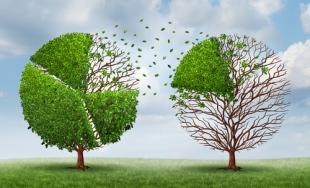
Date: 2025-04-04 Page is: DBtxt003.php txt00006182
Metrics
Intrinsic Value
This Startup Wants to ‘Hack’ Wall Street for Environmental Good ... Can we reboot financial markets to make them value environmental services more accurately?
Burgess COMMENTARY
Peter Burgess
This Startup Wants to ‘Hack’ Wall Street for Environmental Good ... Can we reboot financial markets to make them value environmental services more accurately?

Shutterstock.com
Our current framework for valuing the environment is mostly based on penalties, such as creating taxes or trading schemes to price externalities like greenhouse gas emissions that cause harm.
But what if we could create a system that actually values our environmental services, rather than just penalize companies and individuals for ruining them?
That's what the folks at Intrinsic Value Exchange (IVE) are attempting to do.
'We looked at the battle that's been going on over negative externalities and decided to take the opposite approach. To better understand how to price the negative, we also have to price the positive,' said Douglas Eger, co-founder of IVE and former CEO of Sheffield Pharmaceuticals, in an interview.
The literature on valuing natural capital is vast. But the mechanisms to actually create a tangible value are scant, if not entirely nonexistent, in the current financial system.
Over the last two years, Eger has been assembling a small 'brain trust' of financial consultants, marketers, corporations and academic partners to build an exchange that will enable trading of environmental services. The organization is currently working on beta versions of the exchange designed for local ecosystems, with a plan to eventually scale as widely as possible and create a Nasdaq-like platform.
In theory, the platform would operate like any other stock exchange. IVE would set up an online database on a particular set of ecosystem services -- a local lake, a bat population or soil quality, for example -- and aggregate as much information on them as possible. It would then distill the information into a digestible format, issue shares to the public and allow people to trade those shares based on their perceived value.
It's easy to calculate the economic impact of cutting down a tree, which our economy readily values as a material used for lumber or paper. But it's difficult to know the exact benefit of keeping that tree alive, allowing it to sequester carbon and clean the soil. IVE hopes finding the intrinsic value of that environmental service can influence decision-making about how to better manage resources.
One of the beta exchanges is planned for the San Francisco Bay. The first step would be to make the bay an entity that people could invest in: SFB, Inc. A percentage of the entity would be held by the company, a percentage would be issued to local stakeholders, and the rest of the shares would be offered to the broader public via an IPO. Then trading would commence.
'As more and more natural assets are priced, a picture will emerge as to the costs of doing business that were not quantifiable before,' wrote Eger in a document outlining the company's strategy. 'The corporation [SFB, Inc.], its managers and its shareholders will now have financial resources as a result of turning intrinsic value into financial capital.' The capital raised through trading could be used to protect wildlife, rebuild wetlands and reduce pollution running off into the bay.
IVE's biggest challenge is building an exchange and a corporate structure that complies with regulatory requirements. The firm is currently petitioning the Securities and Exchange Commission to allow an exchange to exist for 'academic purposes.' But if it can get the concept off the ground, it could be a major step forward in financial innovation.
'What we are doing is creating a financial instrument that can invest in that value without traditional ownership,' said Eger.
The world economy is valued at around $70 trillion. But according to IVE, the estimated service value of natural resources is more than 1 quadrillion dollars -- or 1 thousand trillion dollars. But outside of academic pursuits, very few have attempted to find that value through financial tools. In order to explain its approach, IVE uses a computer analogy. The company equates the exchange to new operating software for the old economic system -- upgrading economy 1.0 to economy 2.0.
A carbon tax would be akin to the security software, preventing the financial and economic systems from creating too much environmental harm. But IVE's exchange would be like 'hacking' those systems and uploading a whole new operating procedure that guides users in a completely different direction.
IVE is currently in the middle of talks with investors and has not released any major funding announcements to date. The startup plans to have a beta exchange up and running within the next six months -- but that will depend on capital availability and regulatory approval.
'If we can move this just a bit further, we could actually make our environment a balance-sheet item,' said Eger.
Until then, the true value of environmental services will remain hidden in our financial markets and the broader economy.
Watch this video describing how IVE's Intrinsic Value Exchange would work: